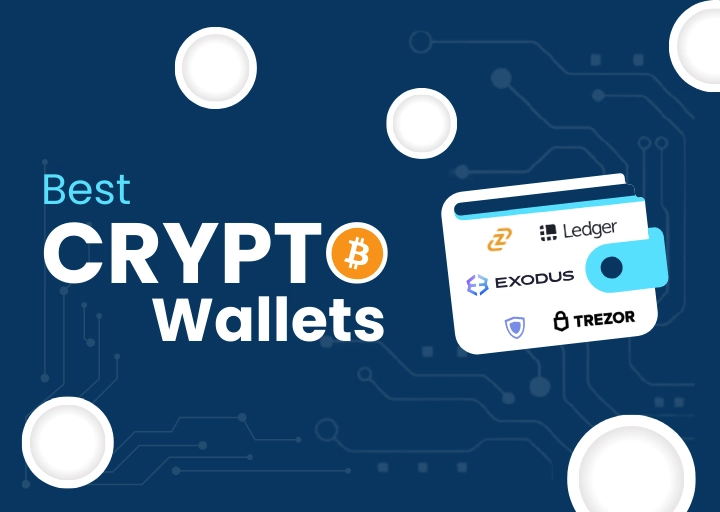9 Best Crypto Wallets for 2025
Crypto.com Onchain and Ledger are among the top crypto wallets for 2025, providing you with full control over your digital assets.
What is a Crypto Wallet?
A crypto wallet is an application that keeps the private information necessary to access your digital assets. Loss of this sensitive information often called “private keys” leads to permanent loss of your cryptocurrency. Hence, securing these keys is important.
How to Choose a Crypto Wallet
The most important choice while choosing a crypto wallet is whether one should opt for a hot wallet or a cold wallet. Among the two most significant differences that divide them, connectivity takes the lead. A hot wallet remains connected. On the contrary, a cold wallet works offline.
Other important considerations include the following:
1- The types of digital assets it supports.
2- How easy it is to transfer cryptocurrency into cold storage, where they will remain offline.
3- Whether a wallet supports staking or rewards programmes within an application.
Table of Contents:
1. What is a Crypto Wallet?
2. How to Choose a Crypto Wallet
3. Best Hot Wallets
3.1 Zengo
3.2 Crypto.com Onchain
3.3 Guarda
3.4 Exodus
3.5 Trust Wallet
3.6 Coinbase Wallet
3.7 MetaMask
4. How Our Ranked Hot Wallets Compare
4.1 Blockchain Studioz’s Ratings for Hot Wallets:
5. Best Cold Wallets
5.1 Ledger
5.2 Trezor
6. How Our Ranked Cold Wallets Compare
6.1 Learn More About Crypto Wallets

Best Hot Wallets
Generally free, with add-on services for trading or staking at an extra cost. Among the main benefits of the wallet are a relatively easy process in exchanging crypto. However, this comes with online risks from various websites.
Here’s a list of the top recommended hot wallets according to Blockchain Studioz
Zengo
*Supported assets: 100+
*Cold storage support: Yes, through WalletConnect
*Staking/DeFi support: Yes
Zengo is a next-generation wallet that eliminates seed phrases and traditional private keys for cryptography operating on multi-party computation, or MPC. The new technology is supposed to be more secure but have easier private key management than the traditional wallets. According to Zengo, it is the first consumer wallet to use MPC technology, something that, until now, was only for institutions. As of January 2025, the company says no Zengo wallets have been hacked.
Disadvantages: Zengo supports only a few widely used cryptocurrencies, which include Solana, XRP, Cardano, Bitcoin Cash, and Polkadot.
Crypto.com Onchain
*Supported assets: Over 1,000
*Cold storage supported: Yes, for Desktop
* Staking/DeFi supported: Yes
Crypto.com Onchain is developed by a company specializing in crypto exchange services and is meant for decentralized finance applications. Users can access DeFi products such as lending and saving directly through the mobile app or browser extension. The desktop app also supports Ledger hardware wallets.
One of the most impressive features of Crypto.com Onchain is that it is fully integrated with the main Crypto.com app, so users can easily transfer assets between the centralized trading platform and their self-custody wallet.
Note: For Bitcoin, the wallet requires a minimum withdrawal of 0.0012 BTC (approximately $110 as of the last update), making smaller transactions less viable.
Guarda
*Assets supported: More than 300
*Cold storage support: Yes
*Staking/DeFi support: Yes
Guarda is an all-around and free crypto wallet with access through mobile, desktop, and browser extensions. It supports more than 300 digital assets and includes Ledger hardware wallet integration for taking your crypto off into cold storage. It also includes staking programs, making it a rounded-out option for any of your crypto needs.
Exodus
*Assets supported: Over 250
*Cold storage support: Yes
*Staking/DeFi support: Yes
Exodus is an extremely versatile suite that also contains a mobile and desktop application, with the browser extension that enables one to directly purchase, trade, or stake cryptocurrencies right from one’s wallet. Trezor integration is used for convenient cold wallet hot to cold storage movements, and, because it’s free, this service offers a massive library of educational content to assist newcomers into cryptocurrency.
Trust Wallet
*Assets supported: Over 10 million digital assets and 100+ blockchains
*Cold storage support: Yes, via Ledger through browser extension
*Staking/DeFi support: Yes
The Trust Wallet is an official wallet for Binance and supports a fair range of assets. With over 10 million digital assets and 100+ blockchains held within, one can buy, sell, or trade directly through the wallet. Though the exchange supports a significant number of currencies, there’s no detailed list of cryptocurrencies supported on this platform and hence calls for caution. This makes it flexible and dependable with a good number of supported blockchains.
Coinbase Wallet
*Assets supported: Thousands
*Cold storage support: Yes
*Staking/DeFi support: Yes
Coinbase Wallet is a non-custodial product coming from the company behind the largest U.S.-based crypto exchange, Coinbase. Users can store cryptocurrencies themselves, with seamless integration with the Coinbase exchange, a good choice for beginners who are new to self-custody.
The wallet provides mobile and browser-based connections to decentralized applications. However, it is behind the competition in some features, such as a desktop app, although the browser extension connects to the Ledger hardware wallet for cold storage.
MetaMask
*Assets supported: Over 650,000, with the option to manually add unsupported ERC-20 tokens
*Cold storage support: Yes
*Staking/DeFi support: Yes
MetaMask is a free, open-source wallet mainly used for the Ethereum blockchain. It supports any kind of digital asset that is built on Ethereum, so it’s an application useful to users to interact with “Web3” applications requiring crypto transactions. MetaMask offers mobile and browser wallets; it does not have a desktop app. The MetaMask Portfolio feature will allow access to staking and DeFi applications.
While its flexibility really shines through in Ethereum-based transactions, this might not be the best fit for users that mainly use non-Ethereum cryptocurrencies.
How Our Ranked Hot Wallets Compare
There is a big market offering hundreds and thousands of hot wallets. Some even let users trade non-fungible tokens and are directly connected with exchanges where crypto can be purchased or sold.
Blockchain Studioz’s Ratings for Hot Wallets:
*Zengo – 4.8
*Crypto.com DeFi Wallet – 4.8
*Guarda – 4.6
*Exodus – 4.5
*Trust Wallet – 4.4
*Coinbase Wallet – 4.3
*MetaMask – 4.0
Best Cold Wallets
A cold wallet is a hardware that is not online. They are safe ways of storing crypto information. Though it is expensive as compared to a hot wallet due to the use of hardware, they are much less susceptible to online threats as they are not connected to the internet. Still, if one loses the device, recovery is pretty tough.
When comparing cold wallets, consider factors like price, security features, and compatibility with your hot wallet.
Top Cold Wallet Recommendations from Blockchain Studioz:
Ledger
*Assets supported: Over 5,500
*Online storage support: Yes
*Staking/DeFi support: Yes
Ledger is one of the popular brands in crypto storage. Its hardware wallets cost between $79 and $249. The software wallets that it supports are Crypto.com and Guarda. It has a mobile app, desktop app, and browser extension. The additional features are two-factor authentication and a full library of educational resources.
Trezor
*Assets supported: Over 9,000
*Online storage support: Yes
*Staking/DeFi support: Yes
Trezor provides safe offline storage with a touchscreen for on-device input. It does not natively offer staking or NFT management but does support integrations with wallets like Exodus, which does support staking and crypto purchase through its software products. It starts at around $35 in the Model One but has another model with the touchscreen at $179. Trezor Suite Lite is available on Apple devices and Android.
How Our Ranked Cold Wallets Compare
*Ledger – 5.0
*Trezor – 4.0
Learn More About Crypto Wallets
What Are Non-Custodial Crypto Wallets?
Non-custodial crypto wallets are favorites among crypto fans because they offer full control of private data. Unlike placing your assets on a cryptocurrency exchange, where the private keys are stored by a third party, the non-custodial wallet is the user’s sole responsibility.
However, this also comes with certain risks:
– They are less forgiving if you lose your password or recovery phrases.
– They depend on the hardware and software properly functioning in the wallet.
– Frequent asset transfers between wallets can become costly due to blockchain network transaction fees.
Many crypto users maintain multiple wallets:
– Long-term storage wallets for safekeeping.
– Active trading wallets for frequent transactions.
If you’re focused on a specific cryptocurrency, consider single-purpose wallets designed for it. For example:
*MetaMask: A flagship wallet for Ethereum and ERC-20 tokens.
* Electrum: The go-to wallet for the Bitcoin enthusiast; features are highly tailored to meet the needs of Bitcoin power users.
If you need to track several cryptocurrencies, it may make sense to explore multi-purpose wallets and compare those that best meet your needs.
Is There Any Other Way To Invest In Crypto?
Yes, you can store your crypto on a cryptocurrency exchange, where a third party holds your assets. Some traditional brokerages, such as Fidelity and Robinhood, also let you buy crypto through their platforms.
Can I Move Crypto From a Traditional Online Broker to a Crypto Wallet?
This differs by brokerage. It can be done at Robinhood, for example, but cannot be done at others. What options you do have depends on a spreadsheet detailing all major crypto exchanges and their respective apps, showing those supporting transferring to external wallets.
How Do I Buy Crypto?
Once you have a crypto wallet, you can begin buying cryptocurrencies through several means:
*Crypto exchanges: Include Coinbase, Binance, etc.
*Traditional brokers: Robinhood, Fidelity, and so on.
*Money transfer services: Some of them offer crypto buying features.
* Bitcoin ATMs: Physical kiosks that have crypto.

Principal Consultant